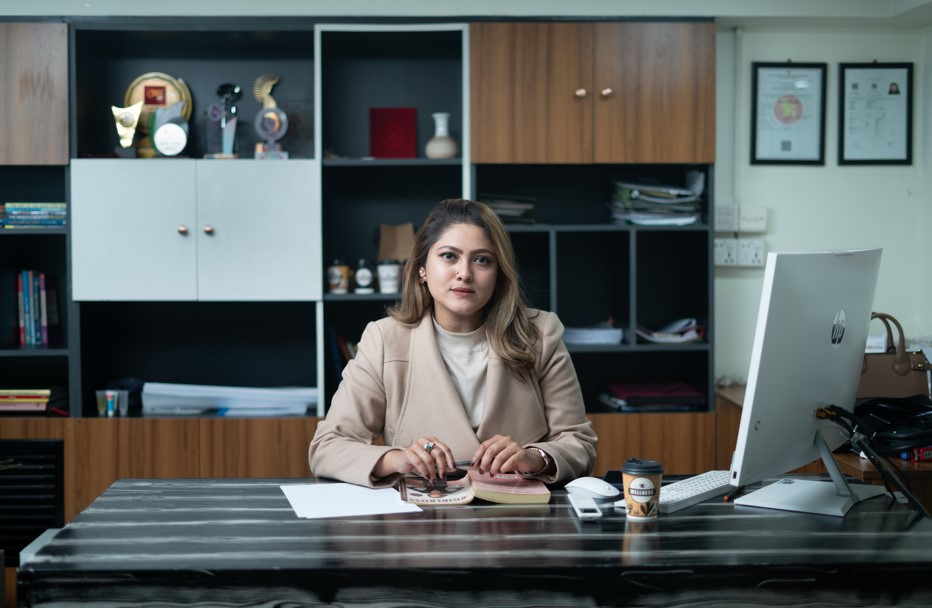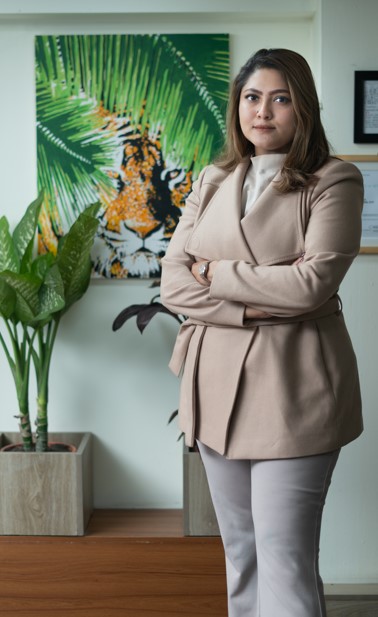Revolutionizing Wellness: A Conversation with Parisha Shamim, Founder of Wellness Ventures
In an exclusive interview, Parisha Shamim, the visionary founder of Wellness, shares her journey into the wellness industry, revealing the inspirations behind her unique approach at the intersection of healthcare and prevention. Parisha, the only daughter of Labaid Group Managing Director Dr. Shamim and Dr. Sucharita Ahmed, is not only an Architecture graduate from BRAC University but also one of the executive directors of Labaid Group and the managing director of Labaid Specialized Hospital, Chattogram. From the patient service model to environmental initiatives, culinary ventures, and higher education pursuits at Oxford, Parisha provides insights into her multifaceted ventures and the impact she envisions for Bangladesh’s healthcare landscape. Discover the compelling story of Wellness, its expansion plans, and Parisha’s commitment to fostering well-being and empowerment.

What inspired you to venture into the wellness industry, particularly the intersection of healthcare and prevention, leading to the establishment of Wellness?
Parisha: My wellness journey began during the COVID-19 pandemic in March 2020 when we realized the significance of prevention over treatment. Witnessing various health issues such as food poisoning and the scarcity of quality food, I was prompted to focus on wellness. The transition started with a cloud kitchen, driven by the desire to establish my own identity and promote female empowerment through financial independence.
Can you elaborate on the unique aspects of Wellness, encompassing the patient service, infrastructure, and the Garden Bistro, along with its impact on healthcare professionals and the community?
Parisha: Certainly. In the patient service realm, we prioritize prevention by providing patients with six customized meals, fostering a proactive approach to their well-being. The infrastructure ensures organic and quality ingredients sourced from our Labaid Agros. The introduction of a temperature-controlled trolley system for food transfer sets a new standard. The Garden Bistro initiated as a space for healthcare professionals to unwind, has positively impacted their well-being. Additionally, Wellness extends to 18 coffee kiosks across Dhaka, emphasizing the importance of good nutrition for readers and customers. The vision for 2024 includes expanding to Mymensingh, Sylhet, and Barisal.
Furthermore, recognizing the diverse health needs of our patients, we have implemented a therapeutic diet program tailored to individual health conditions and allergy levels. Our dedicated team of nutritionists works closely with healthcare providers to design specialized meal plans that contribute to the overall well-being of each patient. This commitment to personalized care ensures that dietary interventions align with specific health requirements, promoting a holistic approach to healthcare.
Why did you choose coffee over tea for Wellness, and how does it align with your vision of creating a mass brand accessible to people across various cities in Bangladesh?
Parisha: Parisha: Coffee was chosen for Wellness due to its associated health benefits, such as aiding thyroid function and stress reduction. The vision extends beyond Dhaka, reaching cities like Chittagong, Sylhet, Bogra, Barisal, and Khulna, aiming to cater to students and people across diverse locations. Our coffee offerings prioritize calorie count and weight management, fostering a positive coffee and conversation culture to enhance the well-being of our customers.
Could you elaborate on Wellness’s environmental initiatives, specifically the recycling of coffee for fertilizer, the challenges faced with eco-friendly packaging, and the upcoming launches involving calorie count, biodegradable products, and a connection map for physical activity?
Parisha: Certainly. In line with the environmental parameters of Wellness, we implemented innovative measures such as recycling used coffee as fertilizer, contributing to green initiatives. Challenges arise in adopting eco-friendly or biodegradable packaging due to the lack of local factories. Future launches include a detailed calorie count system, introducing biodegradable products, and a connection map to encourage physical activity, targeting a March 2024 release. Additionally, a mental health program is set to launch, addressing the importance of acknowledging and discussing mental well-being through a separate entity within Wellness Ventures.
Can you share the inspiration behind your projects “Zen” and “Brunch at Bailey” outside the healthcare sector, and how these ventures aim to offer meaningful recreational experiences and vibrant atmospheres?
Parisha: Absolutely. “Zen” emerged from my desire to transform the common recreational activity of eating out into a meaningful experience, akin to the concept of zen. Despite initial scepticism, the fusion dining space in Dhanmondi resonated well with a diverse crowd, providing a coastal bohemian atmosphere amidst the hustle and bustle where one can truly breathe. On the other hand, “Brunch at Bailey” was inspired by my own school and college experiences, aiming to recreate the colorful and carefree atmosphere of that time. Both projects focus on vibrant atmospheres, good food, and providing spaces for people to relax and breathe, with “Zen” offering a citrus garden ambience and “Brunch at Bailey” capturing the essence of young age – blooming into reality.
Could you elaborate on the impact and diversity of your culinary ventures, including cloud kitchens, bespoke catering, and participation in events like the Dhaka Art Summit and Ekushey Book Fair? Additionally, how does your team contribute to the success of these initiatives, and what role does your employee benefit foundation play in fostering a positive work environment?
Parisha: Certainly. Our culinary ventures extend beyond physical spaces, including cloud kitchens, bespoke catering through “Garnish,” and participation in notable events like Dhaka Art Summit, Dhaka Flow and Ekushey Book Fair. These ventures, along with initiatives such as Dhaka Flow and potential participation in upcoming events like LitFest and Dhaka Makers, aim to make a significant impact. My dedicated team, comprising 180 members across production, operations, and the head office, plays a crucial role. Their collaborative approach and representation of our shared vision contribute to the success of these endeavors. Additionally, we prioritize employee welfare through our Employee Benefit Foundation, a fund for any emergency, taking care of their children’s education, organizing annual picnics and fostering a positive workplace environment.
What motivated your decision to pursue higher education at Oxford, and how has this experience impacted your perspective, especially as the first Bangladeshi in the Said Business School’s master’s program?
Parisha: The decision to pursue higher education at Oxford University stemmed from my desire to broaden my perspective beyond Bangladesh and contribute to global healthcare knowledge. Being one of the very few Bangladeshis in the Said Business School’s master’s program, I took on the responsibility of showcasing our healthcare landscape, Labaid’s contributions, and organizing a summit and project with the Ministry of Health to foster cross-cultural understanding. This experience is altering my mindset, emphasizing long-term leadership strategies for Labaid’s global expansion and focusing on impactful areas such as rural healthcare, women and child health, and mental health. This endeavor will represent Bangladesh on the global stage, contributing to a broader understanding of our healthcare initiatives.
How did your meeting with the Vice-Chancellor of Oxford influence your perception, and what discussions took place regarding female empowerment and healthcare in Bangladesh?
Parisha: The meeting with the Vice-Chancellor of Oxford University was unique, as she expressed limited awareness of Bangladesh and its healthcare landscape. During our conversation, I highlighted the significant developments in Bangladeshi healthcare and the transformative impact of female empowerment, especially with a female Prime Minister. This discussion sparked her interest, and she even expressed a willingness to visit Bangladesh if her schedule permits. As a result, plans are underway for a grand healthcare summit and women empowerment summit in December 2024, showcasing the advancements and contributions of Bangladesh in the global healthcare arena.
How do you plan to introduce the concept of Wellness to people in peripheral districts where the idea of preventive healthcare may be unfamiliar and affordability is a concern?
Parisha: Our approach involves a comprehensive strategy. Firstly, we prioritize education, making people aware of the importance of preventive healthcare and overall wellness. Publicity campaigns play a crucial role in spreading awareness. Secondly, we follow up with practical initiatives by providing nutritious food options and creating budgeting awareness, teaching individuals to allocate a portion of their income for their well-being. Thirdly, we focus on accessibility by establishing flagship outlets and offering appealing combos and special offers. Lastly, our communication strategy involves tailoring our messages to resonate with local communities, using their language and accent to ensure effective outreach. The initial implementation of these steps will commence in Mymensingh, targeting educational institutions and creating awareness among the population, with a strong emphasis on teaching budgeting and savings while prioritizing their wellness.
Why have you chosen not to opt for a franchise model in Chittagong, and what is the unique approach you are taking for the healthcare setup and food services in the region?
Parisha: Chittagong presents a distinctive setup for us as we’re establishing a 100-bed specialist hospital that integrates patient service, a bistro, and wellness facilities. The portfolio includes a substantial 5000 sq feet production facility outside the hospital. The decision not to pursue a franchise model is rooted in my long-standing vision of building a brand originating in Bangladesh and extending it globally. This choice aligns with my goal of showcasing Bangladeshi products on an international scale. Our pride lies in contributing unique Bangladeshi flavors to global cuisine. For instance, we plan to introduce items like beef kala vuna in place of chicken tikka masala and wraps featuring local vegetables and daal. The broader perspective is to position Bangladesh on the global culinary map.


